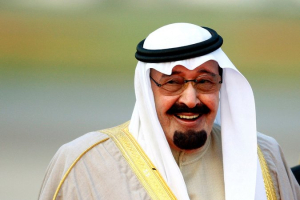Saudi Arabia's King Abdullah, an important U.S. ally in the Middle East and a major force in the Muslim world, died early Friday morning at age 90 from a bout of pneumonia.
According to Ahmed al Omran of the Wall Street Journal, the king was personally popular amongst his people. His successor, 79-year-old Crown Prince Salam, became the new king and decided to issue some decrees before laying his predecessor to rest.
"We will continue adhering to the correct policies which Saudi Arabia has followed since its establishment," Salman said.
Aya Batrawy of the Associated Press reported that Salman previously served 50 years as the governor of the capital, Riyadh, and later became defense minister. As for his predecessor, Muslim dignitaries from around the world attended his "subdued and austere funeral" on Friday.
"Buried that same afternoon in an unmarked grave, Abdullah's body was shrouded in a simple beige cloth, his remains interred without a coffin in line with Islamic tradition that all people - even kings - are equal in death before God," Batrawy wrote.
Omran added that the funeral kept in line with the Wahhabi traditions of Sunni Islam, which "warn against idolizing the dead and instruct mourners to restrain their display of grief."
President Barack Obama, who visited the elder king back in March 2014, issued a statement on Thursday regarding his death. His entire statement was posted by Reuters.
"It is with deep respect that I express my personal condolences and the sympathies of the American people to the family of King Abdullah bin Abdulaziz and to the people of Saudi Arabia," Obama said.
The president then proceeded to eulogize the Saudi king in his statement.
"King Abdullah's life spanned from before the birth of modern Saudi Arabia through its emergence as a critical force within the global economy and a leader among Arab and Islamic nations," Obama said. "He took bold steps in advancing the Arab Peace Initiative, an endeavor that will outlive him as an enduring contribution to the search for peace in the region. At home, King Abdullah's vision was dedicated to the education of his people and to greater engagement with the world."
Obama then turned to relations between the U.S. and Saudi Arabia, which he described as a "genuine and warm friendship."
"As a leader, he was always candid and had the courage of his convictions," Obama said about the Saudi king. "One of those convictions was his steadfast and passionate belief in the importance of the U.S.-Saudi relationship as a force for stability and security in the Middle East and beyond."
The president added that part of King Abdullah's legacy included "the closeness and strength of the partnership between our two countries."
Jim Kuhnhenn of the Associated Press reported that the White House plans to send Vice President Joe Biden to lead a U.S. delegation into the desert kingdom soon to pay respects to the king's family.
Other high-ranking U.S. officials also expressed their condolences to the king's family, according to Kuhnhenn. Secretary of State John Kerry called Abdullah "a brave partner in fighting violent extremism," while Secretary of Defense Chuck Hagel said that the king was "a powerful voice for tolerance, moderation and peace - in the Islamic world and across the globe."

















